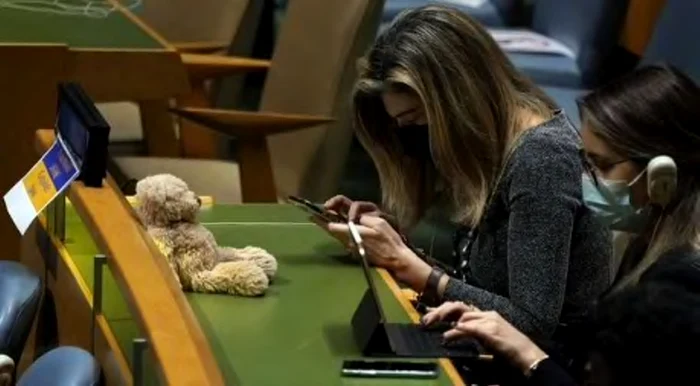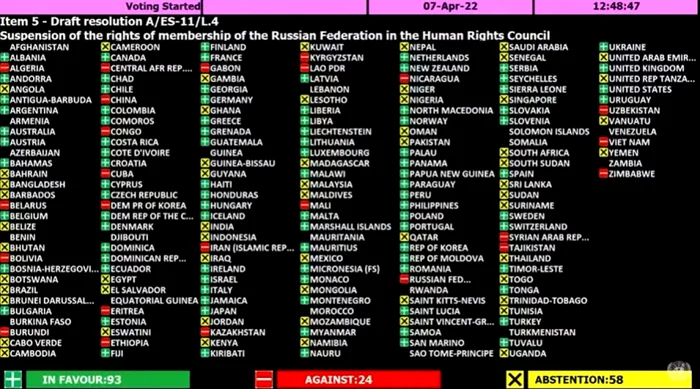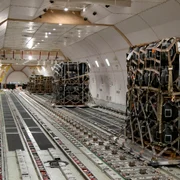
Lumea împărţită în voturi pro şi contra Rusiei: probleme la orizont
0
Ştirea de bază o cunoaşteţi deoarece, în formula scurtă, a făcut rapid înconjurul lumii: prin decizia Adunării Generale a Naţiunilor Unite, Rusiei i-a fost suspendat drepturile care-i reveneau ca ţară membră în Consiliul pentru Drepturile Omului al ONU. Clar, simplu şi foarte uşor de memorat de public.
În realitate, lucrurile sunt puţin mai complicate şi arată că există ceva nori persistenţi în zona deciziei politice la cel mai înalt nivel, lucru deosebit de important deoarece, cum veţi vedea, asta dovedeşte instalarea şi cronicizarea uneia dintre cele mai grave consecinţe provocate la nivel internaţional de invazia rusească în Ucraina: o polarizare absolut nedorită între grupurile de ţări care susţin sancţiunile împotriva Rusiei şi cele care se opun sau se abţin în a lua o atitudine fermă, fapt echivalent, pe fond, cu un sprijin pentru Federaţia Rusă. Cu un raport de forţă neaşteptat, 93 de voturi pentru şi, de partea cealaltă, 24 împotrivă şi 58 de abţineri.
Cred că e bine să vedeţi şi listele desfăşurate de vot, indicaţie extrem de precisă asupra opţiunii politice a ţărilor în cauză.

Şi iată lista ţărilor în funcţie de opţiunile exprimate:
93 de ţări au votat în favoarea suspendării Rusiei:
- Albania
- Andorra
- Antigua şi Barbuda
- Argentina
- Australia
- Austria
- Bahamas
- Belgia
- Bosnia şi Herţegovina
- Bulgaria
- Canada
- Ciad
- Chile
- Columbia
- Comore
- Costa Rica
- Coasta de Fildeş
- Croaţia
- Cipru
- Republica Cehă
- Republica Democratică Congo
- Danemarca
- Dominica
- Republica Dominicană
- Ecuador
- Estonia
- Fiji
- Finlanda
- Franţa
- Georgia
- Germania
- Grecia
- Grenada
- Guatemala
- Haiti
- Honduras
- Ungaria
- Islanda
- Irlanda
- Israel
- Italia
- Jamaica
- Japonia
- Kiribati
- Letonia
- Liberia
- Libia
- Liechtenstein
- Lituania
- Luxemburg
- Malawi
- Malta
- Insulele Marshall
- Mauritius
- Micronezia
- Monaco
- Muntenegru
- Myanmar
- Nauru
- Olanda
- Noua Zeelandă
- Macedonia de nord
- Norvegia
- Palau
- Panama
- Papua Noua Guinee
- Paraguay
- Peru
- Filipine
- Polonia
- Portugalia
- Republica Coreea
- Republica Moldova
- România
- St Lucia
- Samoa
- San Marino
- Serbia
- Seychelles
- Sierra Leone
- Slovacia
- Slovenia
- Spania
- Suedia
- Elveţia
- Timor-Leste
- Tonga
- Turcia
- Tuvalu
- Ucraina
- Marea Britanie
- Statele Unite
- Uruguay
24 de ţări au votat împotriva suspendării Rusiei :
- Algeria
- Belarus
- Bolivia
- Burundi
- Republica Centrafricană
- China
- Congo
- Cuba
- Eritrea
- Etiopia
- Gabon
- Iran
- Kazahstan
- Kirghizstan
- Laos
- Mali
- Nicaragua
- Coreea de Nord
- Rusia
- Siria
- Tadjikistan
- Uzbekistan
- Vietnam
- Zimbabwe
58 de ţări s-au abţinut de la vot:
- Angola
- Bahrain
- Bangladesh
- Barbados
- Belize
- Bhutan
- Botswana
- Brazilia
- Brunei
- Cambodgia
- Camerun
- Capul Verde
- Egipt
- El Salvador
- Eswatini
- Gambia
- Ghana
- Guinea-Bissau
- Guyana
- India
- Indonezia
- Irak
- Iordania
- Kenya
- Kuweit
- Lesotho
- Madagascar
- Malaysia
- Maldive
- Mexic
- Mongolia
- Mozambic
- Namibia
- Nepal
- Niger
- Nigeria
- Oman
- Pakistan
- Qatar
- St Kitts şi Nevis
- St Vincent şi Grenadine
- Arabia Saudită
- Senegal
- Singapore
- Africa de Sud
- Sudanul de Sud
- Sri Lanka
- Sudan
- Suriname
- Tanzania
- Thailanda
- Togo
- Trinidad şi Tobago
- Tunisia
- Uganda
- Emiratele Arabe Unite
- Vanuatu
- Yemen
De ce vă atrag atenţia asupra acestei liste? Pentru că, în opinia mea, există un fapt deosebit de greu de explicat: pe 2 martie, în acelaşi for, era votată cu o zdrobitoare majoritate (141 pentru, 5 împotrivă şi 38 de abţineri) o Rezoluţie (sponsorizată de peste 90 de ţări) în care "agresiunea" Rusiei în Ucraina către şi se cerea Moscovei încetarea folosirii forţei şi retragerea completă şi necondiţionată a trupelor din spaţiul suveran al Ucrainei delimitat de frontierele internaţional recunoscute.
Care este oare motivul pentru care, după doar o lună, chiar dacă au apărut sute şi sute de imagini ale ororilor petrecute în Ucraina, catalogate drept crime de război, acte de genocid şi crime împotriva umanităţii, s-a schimbat în aşa măsură raportul de forţe între cei care cer condamnarea Rusiei şi apărătorii acesteia? Întrebarea este importantă acum dar şi, mai ales, pentru ce se preconizează ca viitor, în special odată cu intensificarea iniţiativelor privind sprijinirea acţiunilor Curţii Penale Internaţionale în pregătirea unui proces intentat împotriva decidenţilor politici şi militari din Rusia. Sau, aşa cum se aude acum, pentru formarea, prin decizia Adunării Generale a ONU, a unui Tribunal special pentru Rusia, pe modelul celui care a funcţionat mai demult pentru a judeca crimele de război din fosta Iugoslavie.
Iată, dintre multe documente existente şi iniţiative deja trecute în domeniul public, cea depusă ca Camera Reprezentanţilor din SUA mi se pare a fi cel mai aproape de formula care poate genera cadrul pentru un nou Proces de la Nurnberg:
H. R. 7276
AN ACT
To direct the President to submit to Congress a report on United States Government efforts to collect, analyze, and preserve evidence and information related to war crimes and other atrocities committed during the full-scale Russian invasion of Ukraine since February 24, 2022, and for other purposes.
Be it enacted by the Senate and House of Representatives of the United States of America in Congress assembled,
SECTION 1. SHORT TITLE.
This Act may be cited as the “Ukraine Invasion War Crimes Deterrence and Accountability Act”.
SEC. 2. SENSE OF CONGRESS.
It is the sense of Congress that—
(1) in its premeditated, unprovoked, unjustified, and unlawful full-scale invasion of Ukraine that commenced on February 24, 2022, the military of the Government of the Russian Federation under the direction of President Vladimir Putin has committed war crimes that include but are not limited to—
(A) the deliberate targeting of civilians and injuring or killing of noncombatants;
(B) the deliberate targeting and attacking of hospitals, schools, and other non-military buildings dedicated to religion, art, science, or charitable purposes, such as the bombing of a theater in Mariupol that served as a shelter for noncombatants and had the word “children” written clearly in the Russian language outside;
(C) the indiscriminate bombardment of undefended dwellings and buildings;
(D) the wanton destruction of property not justified by military necessity;
(E) unlawful civilian deportations;
(F) the taking of hostages; and
(G) rape, or sexual assault or abuse;
(2) the use of chemical weapons by the Government of the Russian Federation in Ukraine would constitute a war crime, and engaging in any military preparations to use chemical weapons or to develop, produce, stockpile, or retain chemical weapons is prohibited by the Chemical Weapons Convention, to which the Russian Federation is a signatory;
(3) Vladimir Putin has a long record of committing acts of aggression, systematic abuses of human rights, and acts that constitute war crimes or other atrocities both at home and abroad, and the brutality and scale of these actions, including in the Russian Federation republic of Chechnya, Georgia, Syria, and Ukraine, demonstrate the extent to which his regime is willing to flout international norms and values in the pursuit of its objectives;
(4) Vladimir Putin has previously sanctioned the use of chemical weapons at home and abroad, including in the poisonings of Russian spy turned double agent Sergei Skripal and his daughter Yulia and leading Russian opposition figure Aleksey Navalny, and aided and abetted the use of chemical weapons by President Bashar al-Assad in Syria; and
(5) in 2014, the Government of the Russian Federation initiated its unprovoked war of aggression against Ukraine which resulted in its illegal occupation of Crimea, the unrecognized declaration of independence by the so-called “Donetsk People’s Republic” and “Luhansk People’s Republic” by Russia-backed proxies, and numerous human rights violations and deaths of civilians in Ukraine.
SEC. 3. STATEMENT OF POLICY.
It is the policy of the United States—
(1) to collect, analyze, and preserve evidence and information related to war crimes and other atrocities committed during the full-scale Russian invasion of Ukraine that began on February 24, 2022, for use in appropriate domestic, foreign, and international courts and tribunals prosecuting those responsible for such crimes;
(2) to help deter the commission of war crimes and other atrocities in Ukraine by publicizing to the maximum possible extent, including among Russian and other foreign military commanders and troops in Ukraine, efforts to identify and prosecute those responsible for the commission of war crimes during the full-scale Russian invasion of Ukraine that began on February 24, 2022; and
(3) to continue efforts to identify, deter, and pursue accountability for war crimes and other atrocities committed around the world and by other perpetrators, and to leverage international cooperation and best practices in this regard with respect to the current situation in Ukraine.
SEC. 4. REPORT ON UNITED STATES EFFORTS.
Not later than 90 days after the date of the enactment of this Act, and consistent with the protection of intelligence sources and methods, the President shall submit to the appropriate congressional committees a report, which may include a classified annex, describing in detail the following:
(1) United States Government efforts to collect, analyze, and preserve evidence and information related to war crimes and other atrocities committed during the full-scale Russian invasion of Ukraine since February 24, 2022, including a description of—
(A) the respective roles of various agencies, departments, and offices, and the interagency mechanism established for the coordination of such efforts;
(B) the types of information and evidence that are being collected, analyzed, and preserved to help identify those responsible for the commission of war crimes or other atrocities during the full-scale Russian invasion of Ukraine in 2022; and
(C) steps taken to coordinate with, and support the work of, allies, partners, international institutions and organizations, and nongovernmental organizations in such efforts.
(2) Media, public diplomacy, and information operations to make Russian military commanders, troops, political leaders and the Russian people aware of efforts to identify and prosecute those responsible for the commission of war crimes or other atrocities during the full-scale Russian invasion of Ukraine in 2022, and of the types of acts that may be prosecutable.
(3) The process for a domestic, foreign, or international court or tribunal to request and obtain from the United States Government information related to war crimes or other atrocities committed during the full-scale Russian invasion of Ukraine in 2022.
SEC. 5. DEFINITIONS.
In this Act:
(1) APPROPRIATE CONGRESSIONAL COMMITTEES.—The term “appropriate congressional committees” means—
(A) the Committee on Foreign Affairs, the Committee on the Judiciary, and the Permanent Select Committee on Intelligence of the House of Representatives; and
(B) the Committee on Foreign Relations, the Committee on the Judiciary, and the Select Committee on Intelligence of the Senate.
(2) ATROCITIES.—The term “atrocities” has the meaning given that term in section 6(2) of the Elie Wiesel Genocide and Atrocities Prevention Act of 2018 (Public Law 115–441; 22 U.S.C. 2656 note).
(3) WAR CRIME.—The term “war crime” has the meaning given that term in section 2441(c) of title 18, United States Code.
Passed the House of Representatives April 6, 2022.
Attest:
Oare ce mai trebuie să se întâmple în Ucraina, ce tip de masacru şi la ce nivel, pentru ca, într-adevăr, să existe o mişcare generalizată de revoltă care să-i cuprindă sau să-i atingă şi pe politicieni? Sau, dimpotrivă, spaima de efectele politice şi economice ale sancţiunilor va fi mai mare şi, în acest caz, se va schimba şi ponderea voturilor din instanţele internaţionale, cu Rusia redevenind dacă nu de-a dreptul frecventabilă, cel puţin angajată pe calea reintrării în zona acceptării tacite şi productive de tip business as usual?

















